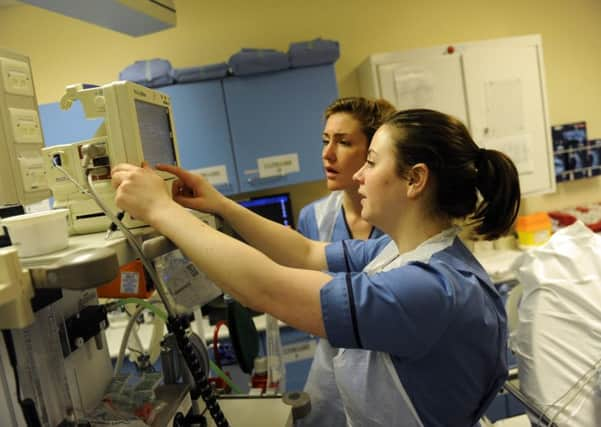Helen Martin: Keep health chat on need-to-know basis


The pace of change and advancement in the health service has continued to increase ever since, and so too has the relationship and communication between patients and doctors, health researchers and the public.
But have we reached the point of “too much information” and crossed the great divide between what we need to know, and what we’d rather not?
Advertisement
Hide AdAdvertisement
Hide AdReports of research confuse us. In the last six months, for example, butter has been bad for us, good for us, and bad again according to teams of scientists around the world spending time and money to come up with different, baffling conclusions. As a result, most of us take all the findings with a pinch of salt . . . and no doubt an expert somewhere will shortly announce that, like saturated fat and coffee, salt isn’t so bad after all.
Last Wednesday, the Evening News carried a story revealing that poor teenage girls in the Lothians are more than twice as likely to become pregnant as richer girls.
The same day, chairman of the British Fertility Society Adam Balen advised girls as young as nine should be told not to leave it too late to start a family and taught how to keep themselves fertile. Girls were wrong, he said, to believe fertility waned from mid-30s when in fact it is in decline by the late 20s. Rich or poor, if you want a big family and can do the maths, best get cracking.
However, the biggest buzzword today is genetics and the ability to identify future risks of disease which presents a far bigger problem than confusion. Apparently, according to a study in the New England Journal of Medicine, one in 20 men carry a faulty gene causing prostate cancer. . . . handy for a doctor to know but perhaps not something a teenage boy wants to spend the next 50 years worrying about.
Advertisement
Hide AdAdvertisement
Hide AdThe most disturbing is a genetic test, developed in Massachusetts General Hospital, that can be taken by 18-year-olds to reveal their risk of eventually developing dementia, along with the claim that identifying those more likely to succumb will allow doctors to monitor them and start treatment as early as possible.
Unfortunately, tie all that in with the candid honesty that now forms a politically correct part of the doctor-patient relationship and we could be looking forward to a time when everyone spends their life knowing – and dreading – what lies ahead.
I remember in the Sixties my mother telling me about a patient who was sent home from hospital unaware that he had terminal lung cancer. When I asked her why they hadn’t told him, she said he might live for another few years so why ruin whatever time he had left?
Today, of course, treatment can extend life, especially if cancer is detected early, so patients have to know the options available.
Advertisement
Hide AdAdvertisement
Hide AdBut if genetic testing does become a preventative norm, isn’t there a case for doctors keeping those futuristic possibilities (and they are only possibilities) on a separate database and only sharing them with patients when it’s necessary to do so?
Or will future generations have to start facing their own mortality before they’re old enough to buy a pint?
Capital needs safer cycle routes
“I’M pretty terrified of the trams now. I don’t enjoy cycling any more and I avoid cycling on Princes Street” . . . the words of 21-year old geography student Mary Ranson who was injured when her wheel caught in a tram track and she fell in the path of a tram, which mercifully stopped not far from her head.
A small, congested city with its roads shared by trams, buses, delivery lorries, vans, cars and cyclists is, in any reasonable view, hazardous. Cycling in the city centre, especially in rush hour, is for the brave and the daring.
Advertisement
Hide AdAdvertisement
Hide AdA no-skid coating on tram lines will help. But we need more safe, traffic-free, cycle routes – and more cyclists who, like Mary, are prepared to avoid danger zones rather than put themselves at risk to make a two-wheeled point.
Iraq war outrage proves me right
HAVING said last week that a proportional representation voting system for the UK creating a government of consensus could have avoided adversarial and vicious Tory and Labour leadership tussles holding up the far more important business of EU negotiation, the point has been proved again with the Chilcot report.
One party running Britain with one prime minister, exercising presidential-type decisions – based purely on his personal beliefs – to go to war without even including his own cabinet let alone other parties, reveals that our so-called UK democracy can be manipulated into little short of a dictatorship.
And lest we forget, evidence into the death of weapons inspector Dr David Kelly, pictured, who allegedly committed suicide, was ordered to be kept under wraps for 70 years. Call that democracy?
Which one is it, Ruth – EU or UK?
Advertisement
Hide AdAdvertisement
Hide AdI NOW hang on every word Ruth Davidson says – if only to learn how her “over-riding priority” for Scotland to stay in the single market (which must involve free movement of people) will fit with her desire to stay in the UK at all costs.